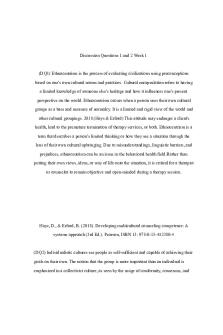Discussion Questions PDF

| Title | Discussion Questions |
|---|---|
| Author | Caroline Dragonetti |
| Course | Sociology of Health & Illness |
| Institution | Boston College |
| Pages | 3 |
| File Size | 54.8 KB |
| File Type | |
| Total Downloads | 100 |
| Total Views | 174 |
Summary
Answer to discussion questions ...
Description
White Chapter Two Discussion Questions 1. What does Fleck mean when he says that only that which is true to culture is true to nature? As a scholar, Fleck argued that knowledge of the natural medical sciences were, in actuality, representations and manifestations of the social sciences. In looking for evidence to support his claims, Fleck drew on the concept of Physics in the 1920s. The discovery of “facts,” were not in fact discoveries made about nature, but were discoveries of theories t hat we believe about nature and the way that things are. Additionally, scientific knowledge does not stand independent of other types of study. Scientific knowledge, according to Fleck, is born out of a shared reservoir of collective knowledge that breeds both agreement and conflict. Using our shifting creation of anatomical drawings throughout time as evidence, Fleck also makes the point that these drawings were made in response to the ideas circulating at the time. Essentially, we do not see more clearly or even better, the way that we see is altered. These drawings are rendered “ideograms”--they are the physical manifestations of our thinking during a given period (at a given place, provided with a given set of information etc.) We cannot observe things critically without approaching them with a set of preconceived
biases or opinions, and therefore, Fleck argues, the way that we see everything is dictated by what is said to be true about it through culture. 2. In what ways are diseases shaped by historical, economic, and religious factors? Diseases have been shaped tremendously by historical, economic, and religious factors, many of which find roots within the political realm of medicine. The creation and permeation of a disease within a given society is dependent on key assumptions that exist within that society. Fleck highlights these assumptions by examining “military metaphors,” “mechanical metaphors,” and “religious thinking.” Specifically, in looking at Syphilis as a disease, Fleck argues that it is still impossible to disassociate the disease completely from its mystical historical roots--the position of the stars, reactions to heavy metals (mercury, namely,) and “bad” blood. Even the Wassermann reaction, a test for Syphilis at the opening of the 20th century, was born out of a desire to curb sexual promiscuity and support political and national agendas regarding biomedical discoveries. Furthermore, the obsession with the concept of invasion at the time (characterized by the rampant use of military metaphor) made microorganisms the “enemy” of the body. Medicine was becoming increasingly popular as a way to arm oneself against these invaders and reclaim your body. The religious
undertones disease, especially in Christianity which viewed illness as a demon that infects someone, furthered Fleck’s point that all aspects of culture (historical, economic, political, and religious) shape our understanding (and belief in) the concept of disease.
3. Are all diseases socially constructed? Diseases are socially constructed because the way each individual views any given “disease” will depend on where and when they are, as well as the accessible opinions on the disease. It is impossible to look at a disease without being influenced by the cultural, historical, conomical, religious, and political elements that catalyzed its genesis and “spread” (in terms of more and more people knowing something as a disease.) The biological elements of a disease do not stand alone--there is a history behind how they came to be understood, as well as current day factors that impact how it is perceived/stigmatized/treated today. Medical knowledge does not stand independently from social knowledge, and though there are many biological and seemingly “natural” parts in the equation, we do not acknowledge the sociology behind medical knowledge enough. Assumptions, concealed desires, and agendas have tremendous effects on the way that we understand disease, and should be acknowledged as so....
Similar Free PDFs

Discussion Questions
- 4 Pages

Discussion Questions
- 3 Pages

Discussion Questions Radiolab
- 1 Pages

Discussion Questions Other Wes
- 3 Pages

Discussion Questions 12
- 1 Pages

Accounting 102 discussion questions
- 25 Pages

Dbq - discussion based questions
- 8 Pages

Chapter 12 Discussion Questions
- 2 Pages

Discussion Questions Week1
- 2 Pages

Online Discussion Questions
- 6 Pages

Seminar-Discussion-Questions Answers
- 29 Pages

Unit 1 Discussion Questions
- 3 Pages

Chapter 7 Discussion Questions
- 2 Pages

Discussion Questions (Chapter 8)
- 1 Pages
Popular Institutions
- Tinajero National High School - Annex
- Politeknik Caltex Riau
- Yokohama City University
- SGT University
- University of Al-Qadisiyah
- Divine Word College of Vigan
- Techniek College Rotterdam
- Universidade de Santiago
- Universiti Teknologi MARA Cawangan Johor Kampus Pasir Gudang
- Poltekkes Kemenkes Yogyakarta
- Baguio City National High School
- Colegio san marcos
- preparatoria uno
- Centro de Bachillerato Tecnológico Industrial y de Servicios No. 107
- Dalian Maritime University
- Quang Trung Secondary School
- Colegio Tecnológico en Informática
- Corporación Regional de Educación Superior
- Grupo CEDVA
- Dar Al Uloom University
- Centro de Estudios Preuniversitarios de la Universidad Nacional de Ingeniería
- 上智大学
- Aakash International School, Nuna Majara
- San Felipe Neri Catholic School
- Kang Chiao International School - New Taipei City
- Misamis Occidental National High School
- Institución Educativa Escuela Normal Juan Ladrilleros
- Kolehiyo ng Pantukan
- Batanes State College
- Instituto Continental
- Sekolah Menengah Kejuruan Kesehatan Kaltara (Tarakan)
- Colegio de La Inmaculada Concepcion - Cebu

